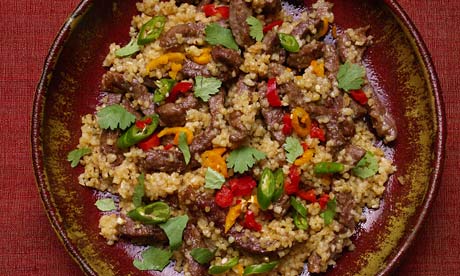
The Christmas I spent in China in 1994 was a feast of nostalgia. My foreign student friends and I had been in Chengdu, the Sichuanese capital, for four months already, deprived of Western delicacies, and we threw ourselves into cooking for our Christmas party. I went to the market and picked out a dozen clucking chickens and quacking ducks, which I later stuffed with a Chinese eight-treasure stuffing (glutinous rice, dried shrimps, lotus seeds) and roasted in the ovens of the university canteen. In the absence of mince pie tins, I cut out rounds of shortcrust pastry and pinched them together around the mincemeat like Chinese dumplings – I've made them that way ever since. Hungry for Christmas pudding, I substituted Chinese jujube dates and Xinjiang apricots for raisins and currants, and steamed it in my dormitory pillowcase (a crime for which I was later fined). Late on Christmas Eve, my classmates and I ate it by candlelight.
In those days, Christmas didn't cause much of a ripple in the life of the Chengdu masses. Now it's become more important as a festival for local believers. My friend Jing is a member of an underground church, and celebrates by throwing a party at her home. She makes a few dishes, such as steamed beef with rice meal, while her guests bring others. Last year, she says, one adult dressed up as Father Christmas, the children dressed as angels, and they all sang Silent Night in Chinese.
Spicy steamed beef with rice meal
beef braising steak 500g
Thai fragrant rice 75g
star anise 1
cassia or cinnamon bark a small piece
For the marinade:
Sichuan chilli bean paste 1½ tbsp
fermented beancurd, mixed with its juices to a creamy consistency 1 tbsp
dark soy sauce 2 tsp
ginger 1 tbsp finely chopped
stock 4 tbsp
Shaoxing wine 2 tbsp
groundnut oil 3 tbsp
ground Sichuanese or Korean chillies (to taste) ½ tsp
ground roasted Sichuan pepper (to taste) ½ tsp
sesame oil 2 tsp
cloves of garlic, crushed and mixed with a little water and salt 2
spring onion greens 2 finely sliced
coriander leaves a small handful, torn
Cut the beef against the grain into ½ cm thick slices. Place in a bowl with the marinade, and set aside.
In a dry wok, stir the rice, star anise and cassia or cinnamon over a moderate flame, until the grains are brittle and yellowish (10-15 minutes). Allow to cool, then grind in a liquidiser to a couscous consistency.
Add the rice meal to the beef, with 75ml cold water, mix well so the beef is evenly coated in rice meal. Place the beef in a heatproof bowl, put the bowl in a steamer and steam for about 2 hours.
Remove the bowl and scatter the beef with the chillies, Sichuan pepper, sesame oil, garlic, spring onions and coriander.
Chinese mince pie dumplings
MAKES ABOUT 40
plain flour 300g with some for dusting
unsalted butter, cut into cubes 150g
egg, beaten 1
mincemeat 1 jar
Set the oven to 190C/gas mark 5. Stir a pinch of salt into the flour in a bowl. Add the butter and rub in with your fingertips until the mixture resembles fine breadcrumbs. Add just enough cold water to bind the mixture into a ball of dough. Wrap in greaseproof paper and leave in the fridge for half an hour or so.
Roll out the pastry fairly thinly on a lightly floured surface. Cut out rounds with a 7.5cm biscuit cutter. Place a round in the palm of one hand, add a scant teaspoon of mincemeat, then draw the opposite edges together and pleat to make a Chinese dumpling.
Place on a non-stick baking sheet. Brush the dumplings with beaten egg, prick each once with a fork, and bake for about 15 minutes, until golden brown.
Fuchsia Dunlop's most recent book is Shark's Fin and Sichuan Pepper.

